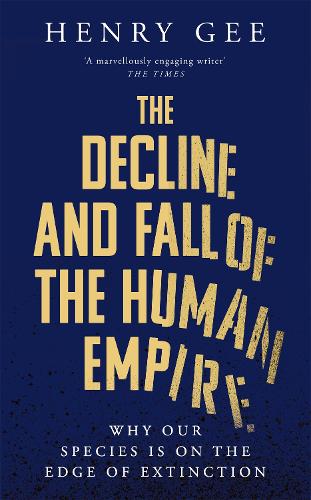
The Decline and Fall of the Human Empire: Why Our Species is on the Edge of Extinction
(Paperback)
Available Formats
Publishing Details
The Decline and Fall of the Human Empire: Why Our Species is on the Edge of Extinction
By (Author) Henry Gee
Pan Macmillan
Picador
10th June 2025
United Kingdom
Classifications
General
Non Fiction
Evolutionary anthropology / Human evolution
Space exploration
909
Physical Properties
Paperback
288
Width 151mm, Height 234mm, Spine 23mm
360g
Description
A marvellously engaging writer' - The Times From the winner of the 2022 Royal Society Science Book Prize, a thrilling and thought-provoking account of the rise and fall of humankind. For the first time in over ten millennia, the rate of human population growth is slowing down. The global population is forecast to begin declining in the second half of this century, and in 10,000 years' time, our species will likely be extinct. In The Decline and Fall of the Human Empire, Henry Gee shows how we arrived at this crucial moment in our history, beginning his story deep in the palaeolithic past and charting our dramatic rise from one species of human among many - teetering on the edge of extinction for more than a hundred millennia - to the most dominant animal to ever live on Earth. But rapid climate change, a stagnating global economy, falling birth rates and an unexplainable decline in average human sperm count are combining to make our chances for longevity increasingly slim. There could be a way forward, but the launch window is narrow. Gee argues that unless Homo sapiens establishes successful colonies in space within the next two centuries, our species is likely to stay earthbound and will have vanished entirely within another 10,000 years, bringing the seven-million-year story of the human lineage to an end. Drawing on a dazzling array of the latest scientific research, Gee tells the extraordinary story of humanity with characteristic warmth and wit, and suggests how our exceptional species might avoid its tragic fate.
Reviews
Henry Gee wrote my favourite book of last year and has now written my favourite book of this year. How he manages to expand my mind, and my knowledge of life on earth, while making me giggle at our own forthcoming extinction, well, taint natural. Put this at the head of your reading lists immediately people. Before its too late -- Eric Idle
Exhilarating . . . With the witty and conversational style that won him the Royal Society Science Book prize, Henry Gee tackles the existential question of humanitys future. Measured and enlightening, Henry Gee is a sage -- Steve Brusatte, author of The Rise and Fall of the Dinosaurs
Like Jared Diamond meets Arthur C. Clarke with a dash of Douglas Adams, this deserves to be widely read and debated -- Philip Ball, author of How Life Works and Critical Mass
A fascinating, deeply researched study of our evolutionary journey and a wonderfully enjoyable adventure -- Michael Bond, author of Wayfinding
Beautifully crafted, superbly researched, witty, with lashes of humour . . . Compulsory reading for all humans, mandatory reading for politicians -- John Long, author of The Secret History of Sharks
A wide-ranging look at the human past and the possibility of our species' extinction . . . serious but nonetheless entertaining * Kirkus Reviews *
Author Bio
Dr Henry Gee was born in 1962. He was educated at the universities of Leeds and Cambridge. For more than three decades he has been a writer and editor at the international science journal Nature. His latest book, A (Very) Short History of Life on Earth, won the 2021 Royal Society Science Book Prize and has been translated into over two dozen languages. He lives in Cromer, Norfolk, with his family and numerous pets.
